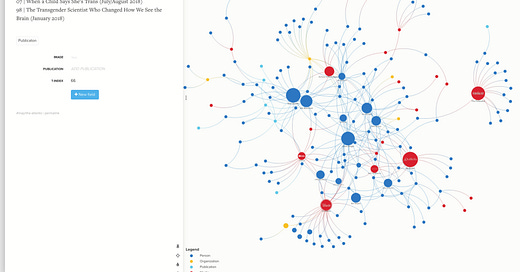Trans People Make Great Chemical Engineers
On systems thinking, polymer processing, and the infrastructure of online transphobia.
This past week, a reader sent me this Twitter thread by Dr. Victor Zavala on why chemical engineers are good “systems thinkers”. It spoke to my soul, especially since systems thinking has been on my mind a lot lately. Let’s chat about it!

Systems thinking is a holistic approach to analysis that focuses on (a) the way that a system's constituent parts interrelate, (b) how systems work over time, and (c) how systems work within the context of larger systems. This is different than small-scale analysis that focuses on one element (or one “unit operation” of a system).
One analogy I like to use is that chemists invent chemical reactions in a lab setting (understanding how reactions work, what temperature/pressure the reactions need to be ran at, what product concentrations can be achieved with what reactant concentrations, etc.) and then they hand their work off to a chemical engineer who builds everything else around that reaction so that it can take place at production scale (upstream operations like integrated heat exchangers and pumps to make sure the reactants and reactor are at the right temperature and pressure, or downstream operations like distillation columns to purify the product, etc.)
Translation: it means we understand shit like this…

When you’re trained in chemical engineering, it doesn’t just mean you’re trained in (for example) “how distillation columns work”. It means you’re trained in understanding how each input and output of the distillation column interacts with each input and output of every operation around it; the reboilers, the pumps, the other separators downstream, the feed stream, and the associated temperatures, pressures, flow rates, and concentrations of each material in each stream. It’s complex!!
For the past few weeks, I’ve been designing a course that will require a LOT of systems thinking. My department is giving me a chance to create my own technical elective, and after some internal reflection (and some conversations with the Polymer Science & Engineering Department at UMass) I decided to craft a course all about polymer processing and sustainability. My idea for the course is to combine technical knowledge about various plastic production techniques (extrusion, compression molding, film blowing, etc.) with broader conversations about engineering ethics and product life cycles.
For example, one week’s lecture would look like this: At the start of lecture, we would review the technical aspects of extrusion and fiber spinning (material considerations, energy inputs, resulting emissions, etc.) Then, we would discuss the history of how plastic has been used in clothing and other textiles. This would lead into a discussion of how the cheap cost of materials such as polyester have enabled the phenomenon of “fast fashion”, after which we can discuss the ethical implications of fast fashion and the problems associated with the clothing industry (namely, pollution and worker exploitation). Finally, we would discuss innovations in the mechanical/chemical upcycling of polymer fibers, and how we can create the infrastructure necessary to recycle/upcycle clothing in a more sustainable manner.
Basically, I’m trying to make a course that’s “peak ChemE”. Not just thinking about chemical reactions, energy inputs/outputs, and emissions, but also about what we do with plastic when we’re done with it, environmental justice values of “who” makes engineering decisions/“who” deals with the consequences, and coming up with solutions for what infrastructure needs to be implemented to deal with the problem of plastic pollution. By virtue of being systems thinkers, I feel as though chemical engineers are particularly suited to solve the problem of plastic pollution. However, there isn’t yet a course at UMass that trains them on the specifics of this particular system (plastic life cycles, chemical upcycling, etc.) So, I’m filling that gap myself!
However! Chemical engineers are the only people who get rigorous training in systems thinking. I would argue that LOTS people are inherently good systems thinkers, by virtue of living in a world where they’re systemically marginalized.
Let’s talk about transness (in America, in the 21st century), since that’s what I have experience in (note my limitations as a white person with a STEM degree here). In engineering, the distinction we make is between systems thinking and traditional analysis. In the realm of transgender liberation, we must distinguish between systems thinking (or perhaps “collectivist thinking”) and individualist thinking.
According to the dominant (neoliberal) standard, we are all individual actors in competition with other individual actors. If you’re having a bad time in society, it’s incumbent upon you to lift yourself up by your bootstraps and do better for yourself. Don’t like your doctor? Simply find a new one. Do your classmates not like you? Get new friends, or move schools. Are you poor? It must be because you have a moral failing as an individual. It can’t possibly be the lack of a social safety net, or the existence of a “system” that exploits working class labor for the benefit of the wealthy. What a ridiculous concept!
Trans people, in my own experience, are particularly good at seeing through this lie. It’s why so many of us are radical leftists. Since in our current society gender touches literally everything, and many of us have seen “both sides” of the binary, we are uniquely good at recognizing the systems that keep us down (cis or trans).
For one, trans people who choose to medically transition have to navigate a medical system that can be slow-moving at best and actively hostile at worst. To get HRT, we need to pay money for several months’ worth of therapy sessions, then wait weeks or months for an appointment to see an endocrinologist, then pay for blood tests and more endo check-ins for years after that. All for life-saving medication. Repeat the process from scratch for every surgery you want to get done. You’re lucky if you go through these processes quickly, you’re extremely lucky if insurance covers the bigger ones, and you very well might be the chosen one if you have a doctor who’s trans themselves. (Trans people often joke that “we know more than our doctors” about HRT, and sometimes that’s very much true.)
And that’s the best case scenario; heaven forbid you’re a drug user, have HIV/AIDS, are a sex worker (many of us are), or have some other experience of marginalization that puts you in risky situations. The “stigma-to-sickness slope” is relevant here. It’s hard to experience life at the margins and think “yes, I as an individual actor have full agency over my own well-being”.


Trans people also have to navigate a toxic media landscape where our very livelihoods are up for debate. While a genocide against trans people rages on, broader discourse hasn’t advanced beyond pointless debates about pronouns and “what is a woman really?” In fact, from our perspective, mainstream media has probably done more harm than good. The double-edged sword of trans visibility is that the more we’re seen, the more we’re attacked.
Take this data from TERF Island (er, I mean the United Kingdom) comparing the number of articles written about trans people and the number of anti-trans hate crimes over several years. It’s difficult to look at this and say that the media is, in general, a neutral force for education.

It’s more than just mainstream media that’s fueling this, of course. As a trans content creator on TikTok, I’ve come face-first with the reality that there’s an infrastructure of online transphobia, a system that if fully mapped out would look at least as complex as the distillation column from earlier.
Sitting at 1.4 million followers, Libs of TikTok is a Twitter account that posts TikTok videos deemed by conservatives to be “cringe” (most often videos made by trans people), often with calls to action for those people to be harassed, confronted in real life, or even fired from their jobs. (And the machine works: several people have been fired from their jobs because of online hate mobs being mobilized against everyday people because they were determined to be “groomers”.) The process flow diagram looks something like this: Transphobes go on Twitter to get daily action items by LoTT and other hate accounts. Conservative media outlets like The Daily Wire and Fox News are in close relationships with the owners of the account, and often report on their tweets uncritically to send even more hate towards trans creators. Well-paid pundits like Matt Walsh and Jordan Peterson build entire careers off of making trans people look foolish, partially from AdSense money and partially from rich conservative donors who funnel money to this hate movement. And all of this lends itself to an increased normalization of anti-trans hate; insert money, output transphobes. Meanwhile, trans people who try to speak out against digital discrimination are silenced and suppressed when they do so. (Note: I just did a whole podcast episode about this if you’d like to learn more!) The deck is very much stacked against us.

These are just two of the biggest examples of systems that work against us. So yes, unfortunately, trans people are excellent systems thinkers. While some of us remain jaded and ignorant to systemic trans issues (and things like racism in the trans community can’t be ignored), on the whole, we can’t help but see the complex mechanisms by which transphobes are produced and how systemic oppression operates to keep us materially worse-off than our cis peers.
I look forward to the day where this isn’t the case. In the meantime, if you’re an engineering firm looking to hire a top-notch systems thinker, consider recruiting them over at oSTEM or Angelica Ross’ TransTech learning community. You won’t regret it!
Currently Reading
Bernice Johnson Reagon’s piece on “Coalition Politics” 🤌
Related to the above topic: this week recorded an episode with the Higher Education Anti-Racist Teaching (H.E.A.R.T.) Podcast! Go subscribe if you’re not already subscribed, the episode will be about inclusive laboratory spaces and will be out in a few weeks! In the meantime, here are some good reads if you’re reading from within STEM academia…
Watch History
“Quiet quitting” has been on the minds of lots of frustrated employers lately, as workers have realized that going “above and beyond” doesn’t tend to make them any more money. The Financial Diet (a finance YouTube channel that doesn’t condescend its listeners and actually takes a somewhat left-leaning approach to personal finance) handled this topic with a brilliant amount of nuance in their recent video essay.
Related:

Bops, Vibes, & Jams
I’ve been immersing myself in study for my Halloween costume. Here’s a hint…
MUNA’s “Live at Electric Lady” EP has me feeling every possible human emotion at once.
And now, your weekly Koko.
That’s all for now! See you next week with more sweet, sweet content.
In solidarity,
-Anna





